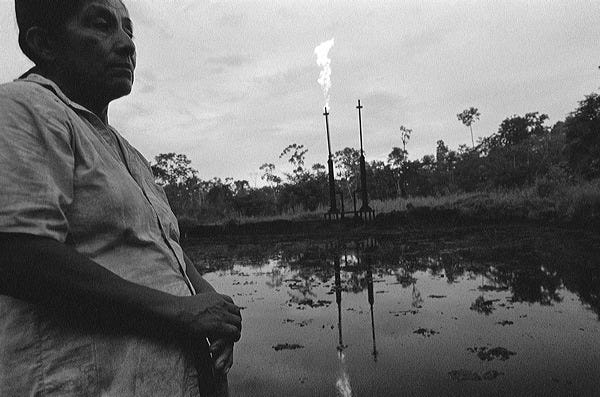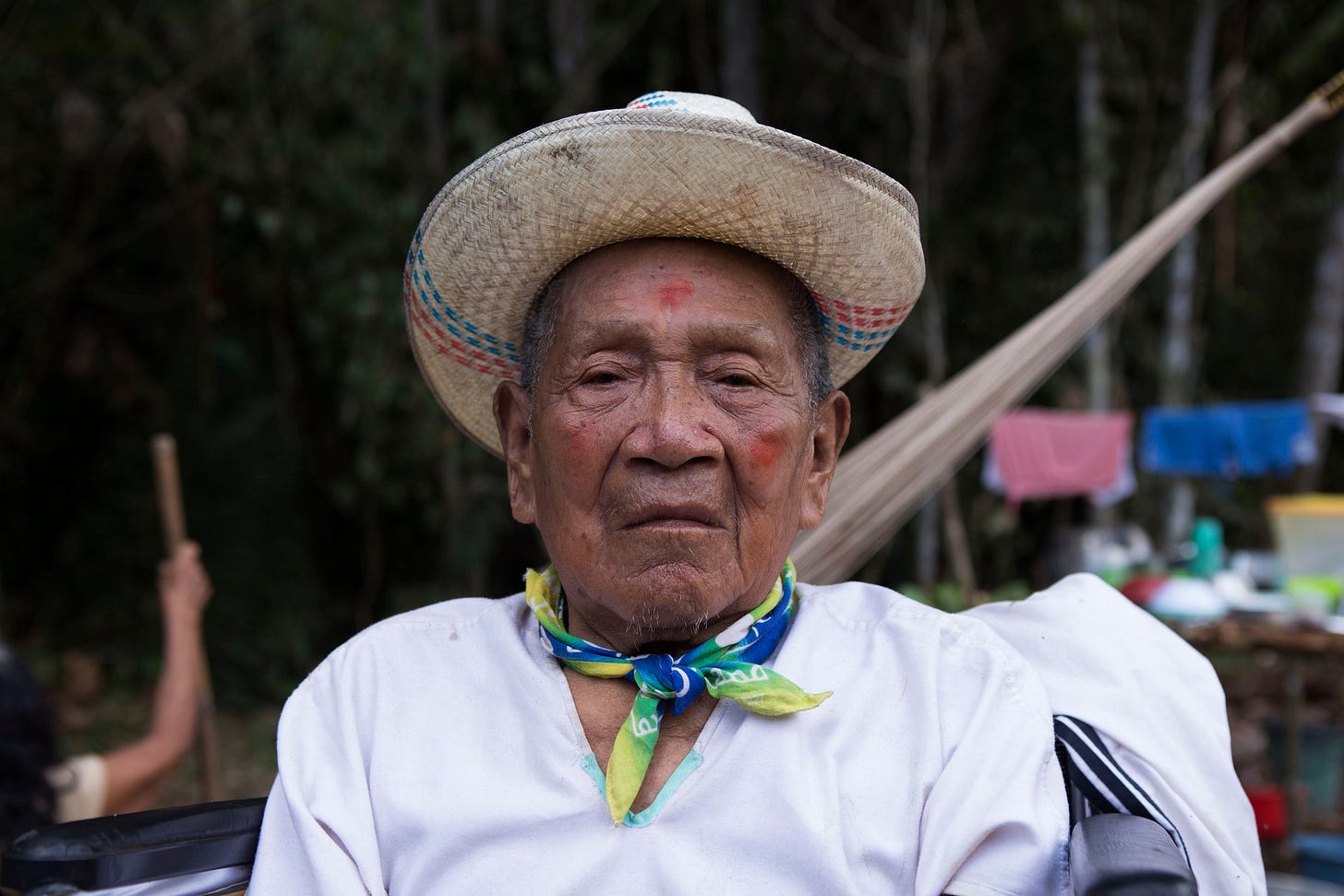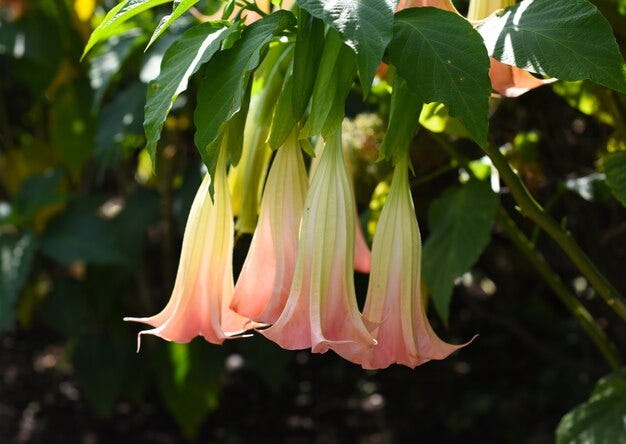Cesario, Who Received Seeds from Heaven
Howling for the loss of a Siekopai master and all the extinction it means.
Craning my neck while casting my eyes to the full moon, I wondered if the world could feel it—if some part of this sentient, mad, living world could feel the death of Don Cesario.
Cesario was already somewhere else the last time I saw him in Siekopai territory, deep in the Sucumbios region of the Ecuadorian Amazon. Day in and out, he swayed in his thready chambira hammock, no longer able to lift the weight of his own body. Heaven, or some other cloudy place, glazed over his eyes as he fiercely negotiated and communed with the spirits he’d courted for over 100 years, living in the forest, drinking the psychoactive botanical potion yajé (also known as ayahuasca).
I was nineteen the first time I traveled to the rainforest to visit the Secoya, or Siekopai people, a small community with a dwindling population of approximately 500. The Siekopai are, notably, one of the communities impacted by the 1964 Chevron-Texaco oil spill—an event called the “Chernobyl of the Amazon” by environmentalists. In this territory of leukemia, asthma, and rainbow petroleum-slicked streams lived the last elders who tended to a multi-generational relationship with the Ñañe siekopaï, the spirits of the Amazon, or “G-d’s multicolored people.”

During my visits I hungrily absorbed the stories, dreams, animal cries and bird songs of the great forest. It is a magical, terrifying, and relieving thing to be surrounded by such diversity. The Amazon rainforest is home to an estimated 10% of the world’s remaining species. Just one hectare (~2.5 acres) of the Ecuadorian Amazon (near Yasuní National Park) hosts more plant and animal species than you can find in the entire North American continent. It is also home to over 400 distinct ethnic human groups, speaking 300 languages. 300 languages! A wild explosion of evolutionary pressure and creativity, indeed.
I found solace in knowing that despite our continued uprooting, displacements and immigration as a human species, the Siekopai elders maintained a vibrant consciousness and conversation with the ecosystem some refer to as the “lungs” and “heart” of the world.
During those interminably long yajé ceremonies, the elders would sway in their hammocks while discussing, bargaining, yelling, and playing with spirits more clearly revealed in the trance. I will never do it justice explaining with words the sounds of these interactions. They sang songs which truly, to me, seemed shaped by the creatures of the forest; boars huffing, monkeys howling, birds singing, water droplets plinking, and some human hums in-between.
Ten years ago, it seemed a distant and impossible reality that they would go—and with them, their relationship with the land. Time went on, and indeed, one by one, the last Siekopai masters died: Rogelio, Delfin, Tintin, and now Cesario. There were others I never met, whose presence I could somehow feel during the nights of yajé with the cicadas, our madness, the king of tapirs, the spirits. "Every time a shaman dies, it is as if a library burns down” said ethnobotanist Mark Plotkin, author if Tales of a Shaman’s Apprentice (1993). It is as if a library burns down. It is more than that, too.
As these great elders die, as our attention dies, as our rivers die, as the animals die, as the clouds die, I wonder: Where do these guardian spirits, trickster spirits, seductress spirits, doctor spirits, flower-umbrella spirits, tiger spirits go when a great shaman of a culture dies? Where do they go, and what do they leave here, on this flowering, fighting plane of reality?
Are they in the stones, the stars? Are they in the hawthorn who thanks us with her flowers as she's untangled from competitive wisteria? Are they in the smooth pebble calling us closer, shining in the creek by our home?
After hearing the news of Cesario’s death, I roamed our garden in the moonlight. The ragwort and cedar appeared silver and different at night. I caught a glimpse of some smouldering embers of a fire left behind, abandoned but still bright. I approached, and by its diminishing light I contemplated the mystery of spirits and where they live, if beyond human mind.
The answer is simple, I know. They are everywhere and nowhere. They are a part of the Mind of Creation—just like us, just like everything. Their objective reality is not so much the question. Their reality to us is.
Yet, the dazzling universes these elders mutually tapped into—their common spirit-tongues, the mutually-occurring visions of boats and cities, demons and daemons, their stories of retrieving new seeds from heaven to plant in the wild soil—does it remain here? Will we ever visit these places again? I’m reminded of the research produced by Benny Shanon, published in his book Antipodes of the Mind (2003). Shanon systematically charted the phenomenology of the ayahuasca experience of different drinkers of different cultural “denominations” across the continent. What he found were incredible similarities in visionary tropes (and, mind you, this is before the widespread use of the internet where such memes could influence their expectations of the experience). Naturally, Shanon draws upon the connection between Jung’s work on the collective unconscious.
These spirits the Siekopai communed with were not “my” spirits, it’s true. I was but a visitor to their land. These spirit-stories were not hosted in the mind of my mother, or in the warm, private thoughts of my people. Yet I experienced visions of extremely specific scenes and characters which seemed far beyond my canon of my consciousness, which were later on confirmed by Siekopai shamans to be their familiars. How might I explain such a mystery?
I don’t spend too much time worrying about proving the existence of spirits. It’s largely a game of “make believe” for me. But this game of make believe keeps me awake, connected, and open to the possibility that there are entities residing over rivers and trees. The perspective keeps me treading tenderly—and honestly, any magical game that can keep my heart open in this world is good enough medicine for me. It also keeps my mind a little wild, a little diverse, to entertain the dimension-hopping creatures lurking in my plain-day periphery.
To the Siekopai: I share the deepest fragrance my flowering, grateful heart for all of your continued efforts to keep these worlds alive. I am very sorry for the loss of Don Cesario, and all that loss means.
One Christmas in Ecuador some moons ago I found myself crying the saltiest-ocean tears beneath a full moon whilst under the spell of yajé cooked by Cesario. Nearby, the pejí (Brugmansia sp.) was in full, intoxicating bloom. Drunk on the potion with my face in the moving grass, I received a crystalline instruction; a message from the stars, dying in the sky, decreeing that I live my life in service of remembering. Remembering people are land.
A decade later, after the elders had all gone, I looked into that fire. From it emerged a word: tend. To bring these spirits back, simply tend to the earth’s creatures and they will return. Death is a lie, and spirits simply go underground, patiently waiting for those who genuinely tend and attend to the land to appear.
Spirits will return on heaven-bound canoes, barreling down the running waters of Ivy, ready to pick up hitchhiking believers. Spirits will return to greet us at the thresholds of their misty groves, where they dwell in trees and teach birds the songs that keep the forests alive. We will be healed once again by the dream-walking doctor people, dressed in robes and feathers, humming as they tend to our wounds with precise pattern and presence.
It must be so, because this world where everything is as it appears is just too boring and dangerous. It must be so, because there are mysterious and untouchable truths about the invisible dimensions of interaction constantly shaping us, our desires, our dreams. It must be so, because I refuse to live in a world without old bodies howling to their celestial lovers in the moonlight, full of their older stories and bird song, drunk on the spells of magical plants.









Sophia! Having drunk with Tintin and Jonathon, your poetic voice sounds in me like Tintin and Rogelio’s icaros, like a resonant conch shell in the fathomless mystery of the bosque! Thank you for your song!
This is gorgeous, Sophia. I especially love "any magical game that can keep my heart open in this world is good enough medicine for me." I'm sorry for the loss of Cesario and all that he held and knew and tended--and also ,as you say so well, the loss isn't as final as it might seem. Anyway, here's to tending seeds.